Credit Cards in France: Types, Usage and How to Choose One

Want to subscribe to a French energy offer?
Our English-speaking Selectra advisors are here to help you find the right energy plan.
(foreign IBANs accepted) at [email protected]. You can contact us also:

With over 68 million of them in circulation in France in 2019, credit cards are the number one payment method in France. But not all cards are created equal, and each type serve different purposes. So what makes a Visa different to a Mastercard? What differentiates a debit from a credit card? Are premium cards worth it? Find out more in the following guide.
- To sum things up
- There is a large variety of bank cards in France, all with their own characteristics and pros and cons.
- Cards either belong to the Visa or the Mastercard network.
- Choosing a French bank card implies comparing a set of features, to find the one right for your situation.
The different types of payment cards in France
There are quite a few types of bank cards in France, and it is important to understand the differences between them in order to choose the right card and optimally manage your payment methods and habits.
ATM cards
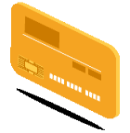
ATM cards, or cartes de retrait, are not designed for making payments. They are simply used to withdraw money from ATMs and typically come with a maximum allowance the user is able to take out on a weekly or monthly basis.
With a carte de retrait, you can also:
- Check your balance
- Order cheque books
- Make deposits via one of your bank network's ATM.
This card is usually free, and is suited for people wanting to easily manage their budget. It is convenient for students and anyone banned from holding a bank account.
Just keep in mind that these ATM cards cannot be used to make transactions in shops or online.
Payment cards
In addition to the services offered by an ATM card, payment cards, or cartes de paiement, allow you to make transactions online or in stores. There are 3 types of payments cards, as detailed below.
Systematic authorisation cards
With a carte à autorisation systématique, it is mandatory that your bank account has sufficient funds in order to make payments; you will not be able to pay if this will make you go overdraft. You may however still be authorised a small overdraft, under certains conditions, which will be stated in your contract).
Upon making a transaction, the payment system will determine how much money is on your account. If it contains enough funds to pay without going overdraft, then the operation is completed, but if not the transaction is cancelled.
The main advantage of having a systematic authorisation card is that it won't come with any bad surprises, since you will only be paying amounts that you actually have on your account.
Note that these cards come with certain drawbacks - for instance, they only function with direct debit, and transaction time will be delayed. Moreover, since these cards won't allow for authorisation holds, they won't function to pay at gas pumps, to pay French motorway tolls or car park fees or to rent a car for instance.
Debit cards
When using a debit card, aka the French carte à débit immédiat, any transaction will show up very quickly, typically 2 to 3 days on your account balance. This can be very handy for the user to keep a live track of his or her finances, and quickly know exactly how much money he or she has on an account.
This said, as it is possible to go overdraft with these cards, and as this will be fined by your French bank, just keep and eye on how much you have left before making transactions.
Deferred debit cards
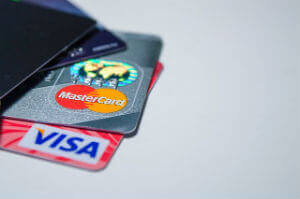
Contrary to debit cards, deferred debit cards or cartes à débit différé won't make your transactions show up on your balance immediately and one after the other.
Rather, the payments you make will show up all together, as a lump sum deducted from your accounts, usually once a month on a fixed date.
The benefit of this system is that, essentially, the bank gives you a 0% credit for up to 30 days, so you don't necessarily need the funds on your accounts to make a purchase.
If you opt for a deferred debit card, although you should be able to track your spendings on your banking app, just make sure you replace sufficient funds in your account before the end of every deduction period, or else you may end up with a bad surprise on the day all your transactions show up!
International cards
Thanks to an international bank card (carte internationale), you can make payments and withdraw money under the same conditions in the Euro zone than in France, and outside of the zone, within the Visa and Mastercard networks, in exchange for a fee. This fee varies from one bank to another, but will, however, be typically cheaper with online banks.
Most bank cards in France today are international in this sense, as national cards are becoming a rare ocurrence.
Their strong selling point are the travel insurances these cards often come with, such as health insurance, death insurance, lost or stolen luggage insurance, plus in some cases, exoneration from paying a deposit on car rentals and early hotel reservations (conditions apply).
Credit cards
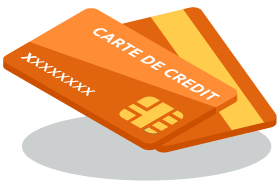
In France, a credit card (carte de crédit) either refer to a standard card provided by a bank, or a card provided by an account in partnership with a private company.
In this second case, these cards can only be used in this company's stores and selling points. They also work as loyalty cards, and allow you not only to pay for all your items in the relevant stores, but also give you access to discounts, speedy check-outs, coupons...
When the customer uses this means of payment as a credit card, he actually has a revolving credit, which is a reserve of money available and accessible at any time. The customer then refunds the money, but at rates higher than those of a conventional loan. The pool is renewed as refunds get made, maintaining a set amount of money (maximum €75,000, allocated for at least 3 months according to the current regulatory framework).
Prepaid cards
Prepaid cards, aka cartes prépayées, enable you to complete transactions for a previously set and capped amount.
No overdraft or credit will be possible with these cards. It can be used just like a standard payment card, but you don't need to open a bank account to get one (an electronic money account is required instead).
You can load your card with up to €1,000 and recharge it at any time, either in one of your bank branches or at a tobacconist's. These cards are anonymous, unless you wish to charge your card with over €1,000, in which case you will have to provide proof of ID and a proof of address.
Mastercard vs Visa
Two international networks reign over the commercialisation of bank cards worldwide: Visa and Mastercard. But what are the differences between both companies? And what do each have to offer?
Mastercard and Visa: what's the difference?
Mastercard and Visa actually offer very similar products. Both companies are equally as present worldwide, although the Visa network is slightly more widespread in Europe whereas Mastercard is a little more extended in the US.
You should have no issue managing your money abroad regardless of which card you go for, as Visa has 1 million ATMs and 29 million traders worldwide, and Mastercard operates near to 900,000 ATMs and has 24 million traders.
The main thing to look out for is the tariffs set by banks. Indeed, each bank offers specific features in terms of annual contributions, payment and withdrawals caps, insurance and assistance guarantees or quality of customer service.
Nevertheless, some differences are noticeable between the Visa and Mastercard with their premium cards and the commercial advantages they offer thanks to their partner brands. For example, you will get access to more commercial advantages with a Gold MasterCard card than a Visa Premier.
The Mastercard cards
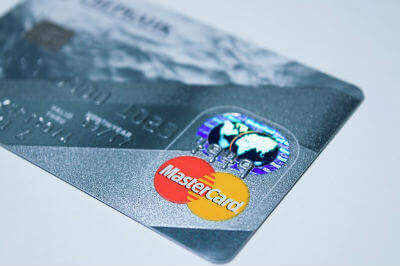
Mastercard in France offers the following cards:
6 Credit cards:
- The Standard Credit Card
- The Gold Credit Card
- The Titanium Credit Card
- The Platinum Credit Card
- The World Credit Card
- The World Elite Credit Card
3 Debit cards:
- The Standard Debit Card
- The Platinum Debit Card
- The Gold Debit Card
- The World Debit Card
A standard prepaid card.
The Visa cards
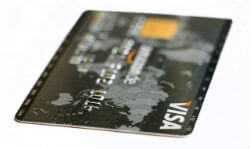
Visa in France offers the following cards:
- The Visa Infinite
- The Visa Platinum and Platinum Business
- The Visa Premier
- The Visa Classic
- The Visa Electron
- The Visa Gold Business
- The Visa Business
- The Visa e-Carte Bleue
- The Visa V Pay
- A Prepaid Visa card
The CB network

In France, the CB Bank card group, known as the "Groupement des Cartes Bancaires CB", is the French national interbank network. It is specific to France and distinct to the international networks Visa and Mastercard. It is often abbreviated to CB, but should not be confused with "Carte Bleue", a brand owned by Visa. Thus, all Cartes Bleues in France are also CB cards, but not all CB cards are Cartes Bleues, as some CB cards can be linked to both the Visa and the Mastercard networks.
The main objective of the CB group is to ensure optimal interbanking of French bank cards, so that all cards are more easily accepted nationwide.
If your card does not display the CB logo, it may not be accepted by French businesses, unless the latter have signed an agreement contract and have the right software installed. You should find stickers off all the accepted cards on shop and restaurant windows.
Choosing a French credit card
To choose a French credit card, you have to take into account items such as:
- The type of card (credit, payment, prepaid, card without an account)
- The debit system (immediate or deferred)
- The price of the card (paid or free)
- The prestige of the card ( standard, premium, elite)
Also, you will have to check if the card is available in the bank you choosed. Check our comparison of French banks more information :
| Bank | For more info | Main characteristics |
|---|---|---|

N26 |
More info on N26 |
|

HSBC |
More info on HSBC |
|

Société Générale |
More info on Societe Generale |
|

Boursorama Banque |
More info on Boursorama |
|

Nickel |
More info on Nickel |
|